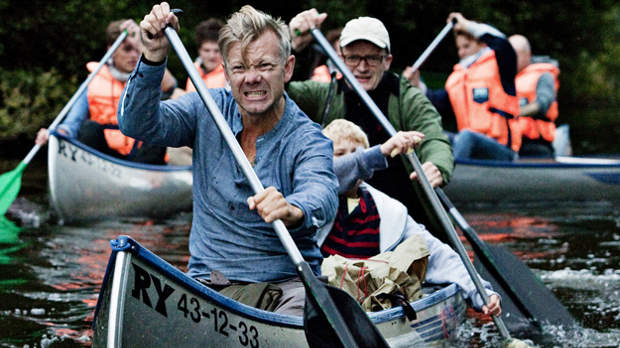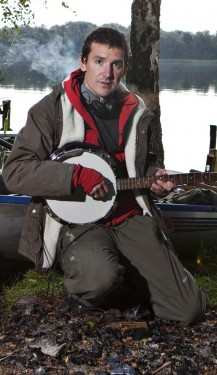 Back to selection
Back to selection
Mikkel Norgaard, Klown

Long considered one of the funniest shows in Scandinavia, the television series Klown features Danish comedians Casper Christensen and Frank Hvam playing Curb Your Enthusiasm-style variations on themselves, getting into hysterically awkward encounters with friends and strangers, loved ones and frenemies, including other Danish celebrities such as actress Iben Hjejle (High Fidelity, The Boss of It All) and Jørgen Leth (the co-director, with Lars von Trier, of The Five Obstructions). Running for six seasons, it propelled the comic duo to the heights of Danish celebrity and mainstream popularity. Now there is a film version of Klown directed by Mikkel Nørgaard, who conceived and directed much of the series with Christensen and Hvam, an uproarious and vulgar and sneakily sentimental comedy, playing like an odd riff on the significantly inferior The Hangover series. Whether it is a canoe trip from hell or the single most unforgettable masturbation joke/set piece you’ll likely ever see, the film contains a wealth of golden comedic moments.
Nørgaard got his start in the TV world, directing Hvam and Christensen in their first, short-lived, comedic TV series Langt fra Las Vegas before finding success with Klown. He’s also directed for the episodic cop drama Anna Pihl (the first Danish TV show to regularly be broadcast in Germany) and the dramatic political series Borgen. Klown, which opened to much acclaim in Denmark and all over Scandinavia late in 2010, is his feature film debut. After its North American premiere at Canada’s Fantasia Film Festival, it has gone on to make stops at Fantastic Fest, Oldenburg and the Wisconsin Film Festival. It opens theatrically on Friday.

Filmmaker: Were there unexpected challenges you encountered bringing this material from television into the cinema?
Nørgaard: I’m so used to this universe, I have a strong sense of the characters. Due to that, it was not that difficult. I think the key thing I had to focus on was expanding our story from 25 minutes without significant character development to a feature film that is 90 or 100 minutes where we wanted much more character development. Especially in the script stage, we had to figure out how to make the character development right for the big screen.
Filmmaker: Did you depart at all from the shooting style you employed in the series? How, if at all, did it change aesthetically from one medium to the other?
Nørgaard: When we started shooting the film, I said I wanted to move it up a level. Up two levels, even. What I meant was I wanted to do something extra because people were going to watch it on the big screen and they expect more there and you want to give them nicer [cinematography]. A little bit more than your typical one and two shots so people know why they went to the cinema to see this film. I still wanted to hang on to the same sort of sensibility we employed on the show, so I liked the idea of shooting with a very small crew. On the show, I think we had fifteen to eighteen people and on the film we have 20, 25 people. It’s not tiny per se, but even in Denmark that is a small crew. I’d like to hold on to that because everybody is involved and they’re very flexible and you have a spirit like you’re just going to go out there and do it in a much more guerilla sort of way.
Filmmaker: I imagine you had much more time to work as compared to the rigorous schedules of TV production.
Nørgaard: Yeah, you know the problem when we’re preparing is that we’re doing 10 episodes a season and so you’re working on 10 stories and you work a little bit on one and then a little bit on another one. Then this time we had to just work on one story and that changed the dynamic a bit. When we did the show, say I had three episodes I really liked and Frank and Caspar maybe had others they were partial to, but this time all three of us had to put all of our energy into one story. We had to be a little bit more careful to get the development of the characters and the progression of the story down. We spent a lot of time on that. And of course, because its on the big screen, the whole development process was a bit different.
Filmmaker: Like on the TV show, you worked with Lars von Trier’s Zentropa as your production company. What is working with them like?
Nørgaard: Zentropa is a great place to work, we did the whole show there as well. They have good energy there. The environment they create is very open and it’s easy to get along. When we were starting out on the series a long time ago, I had discussions with Lars von Trier about what I wanted to do with this and I was very inspired by a series he made called The Kingdom, a hospital series, where he introduced a number of techniques you didn’t see in Denmark often, [such as] the discontinuity of the editing style, where you don’t so much care if the actors are in the right place or if the cut’s in the right place, it’s all about the emotion.
Filmmaker: That looseness and freedom extends throughout much of the work you see come out of their company.
Nørgaard: Exactly. That inspired me a lot for the series as well, so I think that whole environment and then the whole Dogma wave… We didn’t have much money so finding other ways to get the expression that we wanted was vital. I think that was all very important to the development of the series and ultimately the film. We probably could have gotten more money to do the film and we could have done a bigger crew and bigger set up, and been like a real big film, but I wanted a more intimate feel for the film, because I thought it was most important to focus on the characters and the comedy and the story. I wanted the shooting to have a more documentary feel to it.
Filmmaker: Marcuz Jess Petersen, the child who plays Bo, must be a tremendously resourceful and uniquely intuitive performer to keep up with Caspar and Frank and make us the audience feel comfortable with what he’s undergoing.
Nørgaard: It was really crazy. We had a very good casting director. She looked at kids all over Denmark. She had an open casting with over a 1,000 kids. It went all the way down to 10, then down to three. Even after the first round, she said, “This guy Marcuz, he’s really shy, but there’s something about him.” I met him and he’s just amazing because he’s very old inside although he’s just a little kid. He just has a tremendous understanding of the different comic layers in the material. He could laugh about it, help us work through it. He’s just a special, special kid. I was very happy when we found him because it’s such a challenge for a kid to be in a film like this. I mean obviously he was very excited and he and his parents told everybody and whatnot, but he just had such a calmness inside him that was just amazing. He was really something.
Filmmaker: Is there a method to reach a child actor like that which is markedly different from how you direct other performers?
Nørgaard: There’s a lot of challenges working with kids, I guess. Its very important that before you start shooting the whole thing you teach the child to address the character in the third person so that it’s not Marcuz that has a small weenie or it’s not Marcuz that is afraid of the water, it’s Bo. You always talk about the character in the third person, then the child will be able to talk about the character in the third person as well. You have to make a very clear distinction between the person who is playing the role and the role itself. It’s kind of obvious for a grown-up actor to be able to play the role and then go home and put it away, but for a child it’s very important to make that distinction for them: “This is Bo, not Marcuz.” What makes our situation even more unique is that, like the show, our script is only a storyline. There is no scripted dialogue, it’s all improvised on the set.
Filmmaker: That’s got to be doubly challenging for a child in that environment.
Nørgaard: He had to step up to these two guys who are maybe the two best modern-day comics we have in this country. He had to kind of find his way and step up. And he did. Although sometimes when Frank and Casper would make up new scenes or new dialogue it would be so funny, sometimes Marcuz would break character and laugh, and so at some of those hard points I would sort of step in and do some improv with him. So I would take both Frank and Casper’s roles myself and I would play it without any feeling so that he could react or respond naturally. He’s a really bright kid, very savvy, so he could understand the way we were working and felt very comfortable with it because he was also able to speak his own language. He was able to put stuff in their that was his contribution.
Filmmaker: Does shooting that way, where all the dialogue is being improvised in a variety of different manners, affect how you light and cover the scenes? I imagine you have to account for that unpredictability.
Nørgaard: Two things there. Number one, almost the entire film is shot in available light. We did very little lighting. We did something in the brothel, something in the night scenes, but in a film like this, the more time you have to shoot, the better. It’s very important when you improvise. You need a lot of shooting time. Also I often start out with quite wide shots. We shoot two cameras. And I start out wide just also for me to see, “Where is this going, where should we go?” Then when we get a hold of the scene, we move in for the tighter shots. Basically, traditional shooting. But I give them a lot of space. Say we’re shooting a scene that in the finished film will be a minute and a half. Sometimes I’ll give them, six, seven, eight minutes, where they’re just babbling away. And then you go up to them and say, “You know, that was all quite funny, but this part in particular…” and we shape it and decide to keep certain things and do away with others and sharpen our focus still on others. When we’re going good, after five or six takes we have it. It’s a special process where you have to be very open-minded but still know what you want. For a normal drama shoot, I would be prepared for about 90% of what we would do and then you leave about 10% open space for something to happen. When I do Klown, I would say I’m 70% prepared and I leave 30% space for something to happen.
